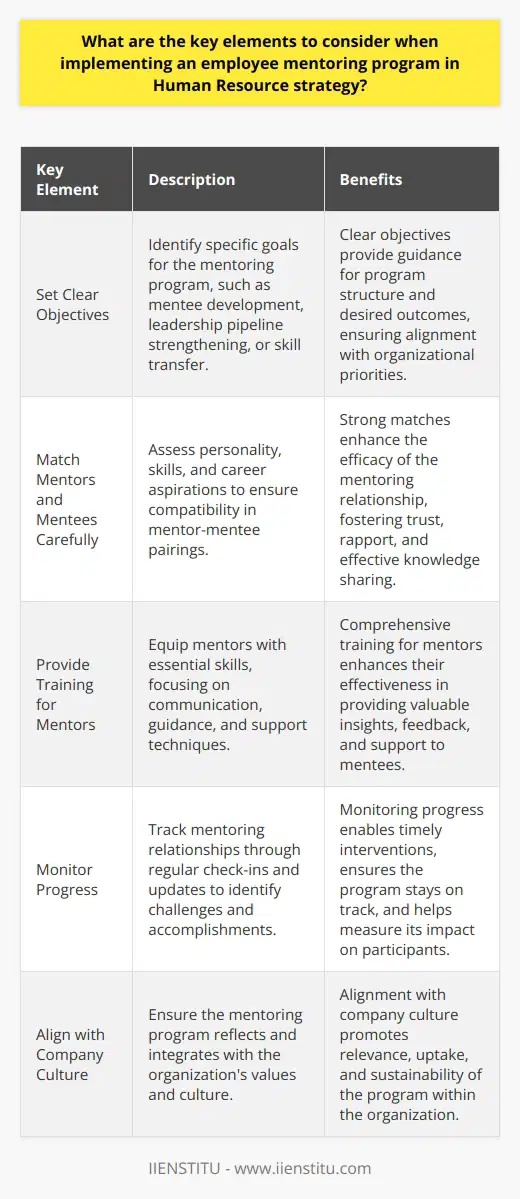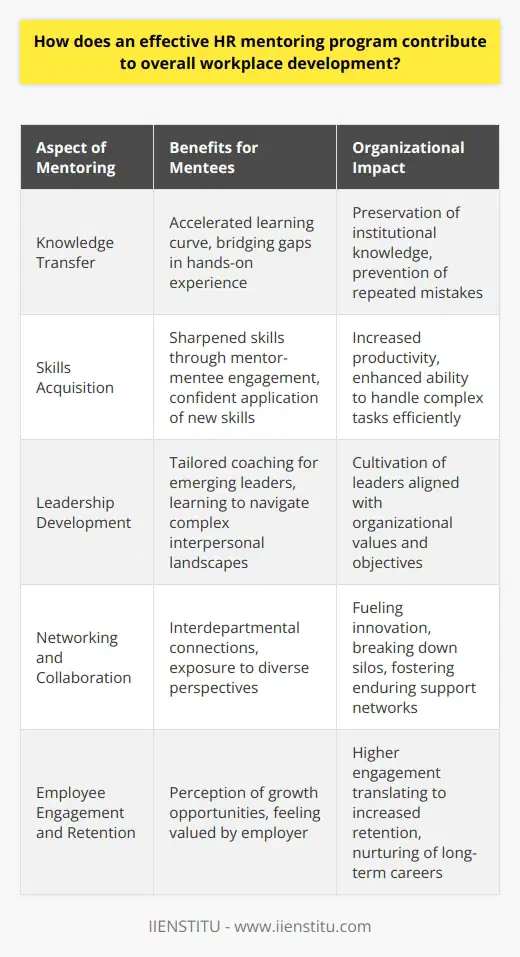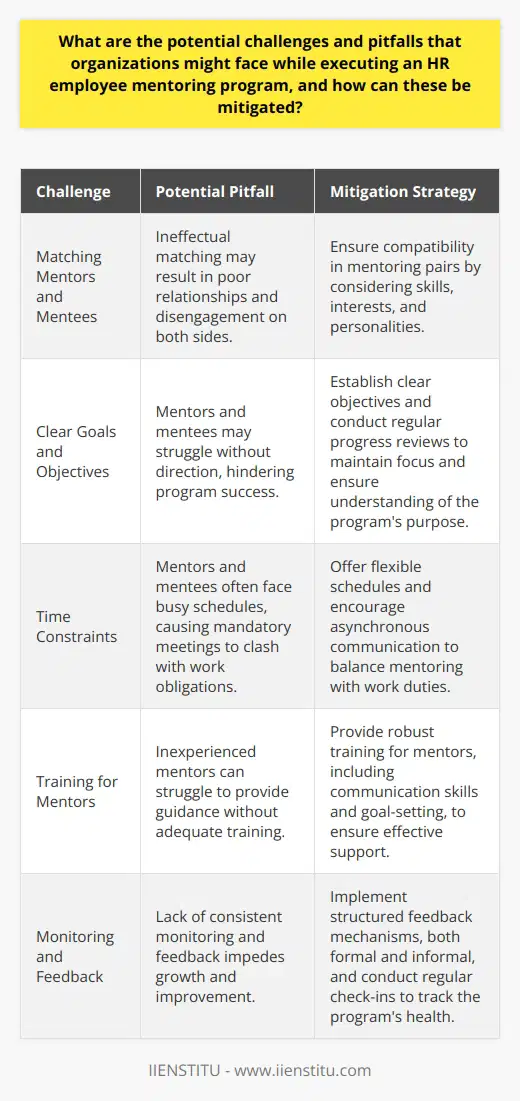
In the ever-evolving landscape of human resources, employee mentoring has emerged as a pivotal strategy for nurturing talent, fostering engagement, and driving organizational success. Gone are the days when training programs alone sufficed; today, mentoring has taken center stage as a powerful tool for employee development and growth. As someone who has witnessed the transformative effects of mentoring firsthand, I can attest to its ability to unlock potential, bridge generational gaps, and create a culture of continuous learning.
When I first stepped into my role as an HR professional, I was eager to make a difference but unsure of where to begin. It was through the guidance of my own mentor that I discovered the true essence of HR employee mentoring. She took me under her wing, sharing her wealth of experience and wisdom, and showing me the ropes of navigating the complex world of human resources. Through our regular conversations and her unwavering support, I gained not only practical skills but also the confidence to tackle challenges head-on.
The power of mentoring lies in its ability to create a safe space for growth and exploration. It is a relationship built on trust, where the mentor acts as a sounding board, offering guidance and constructive feedback. Unlike traditional training programs that focus on imparting specific skills, mentoring takes a holistic approach, addressing the unique needs and aspirations of each individual mentee. It is a journey of self-discovery, where the mentee is empowered to take charge of their own development and chart their path to success.
One of the most remarkable aspects of HR employee mentoring is its impact on employee engagement. When employees feel valued and supported in their growth, they are more likely to be invested in their work and committed to the organization's success. Mentoring creates a sense of belonging, fostering a culture where employees feel connected to their colleagues and the company's mission. I have seen firsthand how mentoring has transformed disengaged employees into passionate advocates for their work, driving productivity and innovation.
Moreover, mentoring plays a vital role in improving employee retention. In today's competitive job market, retaining top talent is a constant challenge for organizations. By providing employees with opportunities for personal and professional growth through mentoring, companies can create a compelling reason for them to stay. When employees feel that their development is a priority and that they have a clear path for advancement within the organization, they are more likely to remain loyal and committed to their roles.
The benefits of mentoring extend beyond individual employees; it also facilitates the transfer of knowledge within the organization. As experienced professionals share their expertise and insights with their mentees, they ensure that valuable institutional knowledge is preserved and passed on to the next generation. This is particularly crucial in industries where long-standing experts are nearing retirement, and there is a risk of losing critical skills and wisdom. By establishing mentoring relationships, organizations can bridge the generational gap and ensure continuity in their operations.
Implementing a successful HR employee mentoring program requires careful planning and execution. The first step is to identify potential mentors who possess the necessary experience, skills, and willingness to invest in the development of others. These individuals should be carefully selected based on their compatibility with potential mentees and their ability to provide guidance and support. Once mentors are identified, the next step is to determine the structure and format of the mentoring program. This may include:
Key Functions Of Human Resource Management For Business Success
How To Align Hrm Strategy And Leadership To Create Successful Employer Brand
1- One-on-one mentoring sessions
2- Group mentoring initiatives
3- Peer mentoring arrangements
The frequency and duration of mentoring interactions should be tailored to the needs of the organization and the participants involved. Clear goals and objectives should be established for both mentors and mentees, ensuring that everyone is aligned and working towards a common purpose. Providing appropriate training for mentors and mentees is also crucial for the success of the program. This training should cover topics such as effective communication, setting expectations, and navigating the dynamics of a mentoring relationship.
While mentoring offers numerous benefits, it is important to anticipate and address potential challenges that may arise. One common challenge is the mismatch between mentors and mentees, where personalities or communication styles may clash. It is essential to have mechanisms in place to address such issues promptly and find alternative mentoring arrangements if necessary. Another challenge is the lack of commitment from either the mentor or the mentee. To mitigate this, it is important to set clear expectations from the outset and establish accountability measures to ensure that both parties are fully engaged in the mentoring process.
Continuous evaluation and improvement are key to the long-term success of any HR employee mentoring program. Regular feedback should be sought from both mentors and mentees to identify areas for improvement and make necessary adjustments. Celebrating the achievements and milestones of mentoring relationships can also help to reinforce the value of the program and encourage ongoing participation.
To illustrate the power of mentoring in action, let us consider a case study of a successful HR employee mentoring program implemented by a leading technology company. The company recognized the need to develop its emerging leaders and foster a culture of innovation and collaboration. They launched a comprehensive mentoring initiative that paired experienced executives with high-potential employees across various departments.
The program began with a careful selection process, where mentors and mentees were matched based on their interests, skills, and development goals. Mentors underwent training to enhance their coaching and communication skills, while mentees received guidance on how to make the most of their mentoring relationships. Regular check-ins and progress reviews were scheduled to ensure that the mentoring partnerships remained on track and aligned with the program's objectives.
Over the course of a year, the mentoring program yielded remarkable results. Mentees reported increased confidence, improved leadership skills, and a clearer sense of direction in their careers. They felt empowered to take on new challenges and contribute more effectively to their teams. Mentors, in turn, found the experience rewarding, as they had the opportunity to share their knowledge and make a meaningful impact on the lives of their mentees.
The success of the mentoring program had a ripple effect throughout the organization. Employee engagement scores soared, and retention rates improved significantly. The company culture transformed, with a greater emphasis on collaboration, innovation, and continuous learning. The program's success was attributed to several key factors, including:
Strong executive support and sponsorship
Careful selection and matching of mentors and mentees
Providing adequate training and resources for participants
Regular communication and progress tracking
Celebrating and recognizing mentoring achievements
The case study serves as a powerful testament to the transformative potential of HR employee mentoring. It demonstrates how a well-designed and executed mentoring program can drive individual growth, foster a positive organizational culture, and contribute to the overall success of the company.
In conclusion, HR employee mentoring has emerged as a strategic imperative in the contemporary professional landscape. It offers a personalized approach to employee development, nurturing talent and unlocking potential in ways that traditional training programs cannot match. By fostering engagement, improving retention, and facilitating knowledge transfer, mentoring creates a win-win situation for both employees and the organization as a whole.
As HR professionals, it is our responsibility to champion mentoring initiatives and create an environment where mentorship can thrive. By carefully designing and implementing mentoring programs, providing the necessary support and resources, and continuously evaluating and improving these initiatives, we can harness the power of mentoring to drive individual and organizational success. The journey may not always be easy, but the rewards are immeasurable. So let us embrace the transformative potential of HR employee mentoring and watch as it propels our organizations towards new heights of excellence.
References:
1- Allen, T. D., Eby, L. T., & Lentz, E. (2006). Mentorship behaviors and mentorship quality associated with formal mentoring programs: Closing the gap between research and practice. Journal of Applied Psychology, 91(3), 567-578.
2- Kram, K. E. (1985). Mentoring at work: Developmental relationships in organizational life. Glenview, IL: Scott, Foresman.
3- Ragins, B. R., & Kram, K. E. (Eds.). (2007). The handbook of mentoring at work: Theory, research, and practice. Thousand Oaks, CA: Sage Publications.
4- Zachary, L. J. (2005). Creating a mentoring culture: The organization's guide. San Francisco, CA: Jossey-Bass.
5- Clutterbuck, D., & Lane, G. (Eds.). (2004). The situational mentor: An international review of competences and capabilities in mentoring. Aldershot, UK: Gower Publishing.
Frequently Asked Questions
What are the key elements to consider when implementing an employee mentoring program in Human Resource strategy?
Understanding Employee Mentoring Programs
Employee mentoring programs enhance workplace dynamics. They foster growth, learning, and career development. Key elements define their success within human resource strategy.
Set Clear Objectives
Identify goals for mentoring. Focus on mentee development, leadership pipeline strengthening, or skill transfer. Clear objectives guide program structure and outcomes.
Match Mentors and Mentees Carefully
Ensure compatibility in mentor-mentee pairings. Assess personality, skills, and career aspirations. Strong matches boost relationship efficacy.
Structure the Program
Create a program framework. Outline expectations, roles, and responsibilities. Clarity supports participant understanding and engagement.
Provide Training for Mentors
Equip mentors with necessary skills. Focus on communication, guidance, and support techniques. Training enhances mentor effectiveness.
Monitor Progress
Track mentoring relationships. Use regular check-ins and updates. Monitoring helps identify challenges and accomplishments.
Offer Support and Resources
Provide resources for participants. Include materials, support personnel, and training opportunities. Adequate support facilitates successful mentoring experiences.
Evaluate and Adapt
Review program impact periodically. Gather feedback from participants. Use insights to refine and improve the program.
Encourage Open Communication
Promote transparency and dialogue. Encourage open sharing of experiences and feedback. Effective communication is critical for mentoring success.
Align with Company Culture
Ensure the program reflects organizational values. Integration with culture promotes relevance and uptake.
Recognize and Reward Participation
Acknowledge mentor and mentee efforts. Recognition reinforces positive behavior and program value.
Employee mentoring programs offer strategic advantages. They require careful planning and execution. Consideration of these elements forms a robust foundation. It ensures the program's alignment with broader organizational goals.

How does an effective HR mentoring program contribute to overall workplace development?
Understanding HR Mentoring Programs
HR mentoring programs serve as strategic assets in workplace development. These initiatives pair less experienced employees with seasoned mentors. The goal is to facilitate knowledge transfer, skills acquisition, and professional growth. Mentoring enhances the learning curve for new staff. It bridges gaps in hands-on experience.
Professional Growth Spurs Organizational Development
Mentors offer insight beyond traditional training methods. They provide guidance, support, and constructive feedback. This allows mentees to take risks and learn from real-world scenarios. As individuals thrive, so too does the collective workforce. A robust mentoring program fosters a culture of continuous learning.
Skill Enhancement Boosts Productivity
Skills sharpen through mentor-mentee engagement. Mentors share expertise, troubleshoot problems, and model best practices. They enable mentees to apply new skills confidently. Enhanced capabilities lead to increased productivity. Complexity becomes less daunting. Tasks are done more efficiently.
Leadership Pipeline Strengthens
Mentoring programs identify and cultivate emerging leaders. Mentees with leadership potential receive tailored coaching. They learn to navigate complex interpersonal landscapes. Leaders developed from within know the company culture. They likely align well with organizational values and objectives.
Networking and Relationship Building
Effective HR mentoring programs facilitate interdepartmental connections. They break down silos. Employees across various roles and functions interact. Diverse perspectives fuel innovation and collaboration. Relationships built within mentoring programs often endure. They provide a resilient support network throughout one's career.
Employee Engagement and Retention Improve
Employees value investment in their professional development. They feel more engaged when they perceive opportunities for growth. Mentoring programs signal an employer's commitment to their workforce. Higher engagement often translates to increased retention. Workers are less likely to leave a company that nurtures their career.
Organizational Knowledge Retention
Experienced staff hold invaluable institutional knowledge. When they retire or move on, their insights can vanish. Mentoring programs help preserve this knowledge. Wisdom gets passed to the next generation of workers. Historical mistakes are not repeated. Best practices endure, sustaining organizational efficiency.
Mentoring Nurtures Adaptability
Mentoring encourages adaptability. Employees become equipped to manage change. They learn the resilience to face evolving industry demands. Competitiveness hinges on such adaptability. Firms that can pivot quickly maintain their edge.
Aligned Goals Signal Coherent Growth
Mentoring integrates personal development with company goals. Employees understand how their growth benefits the organization. Aligned objectives ensure that workforce development supports overall strategy. Unity of vision and purpose underpin a strong and evolving business.
Diversity and Inclusion Receive Support
Diverse workplaces benefit from mentoring programs. They offer equal access to personal development opportunities. Barriers to minority advancement can be addressed. A variety of mentoring pairs brings rich exchanges of cultural and experiential knowledge. Inclusion becomes not just an HR objective but a lived experience.
Program Evaluation Drives Continuous Improvement
Finally, effective mentoring programs include robust evaluation mechanisms. They assess the impact on both individuals and the wider organization. Data informs how these programs can improve. Continuous refinement ensures that mentoring remains relevant and impactful. It keeps pace with organizational and market needs.

What are the potential challenges and pitfalls that organizations might face while executing an HR employee mentoring program, and how can these be mitigated?
Challenges in HR Employee Mentoring Programs
Matching Mentors and Mentees
One common issue lies in pairing mentors with mentees. Ineffectual matching may result in poor relationships. These dynamics can lead to disengagement on both sides. Organizations should ensure compatibility in mentoring pairs. Skills, interests, and personalities matter in these duos. Careful pairing can mitigate this challenge effectively.
Clear Goals and Objectives
Setting unclear goals often hinders program success. Mentors and mentees may struggle without direction. Establishing clear objectives is crucial. Regular progress reviews help maintain focus. This approach ensures both parties understand the program's purpose. Clear communication mitigates misunderstandings.
Time Constraints
Time poses significant challenges for participants. Mentors and mentees often face busy schedules. Mandatory meetings may clash with work obligations. Offering flexible schedules can ease this pressure. Encouraging asynchronous communication is another solution. This flexibility helps balance mentoring with work duties.
Training for Mentors
Mentors may lack adequate training for their role. Inexperienced mentors can struggle to provide guidance. Providing robust training for mentors is essential. This training should include communication skills and goal-setting. With proper preparation, mentors can offer more effective support.
Monitoring and Feedback
Without consistent monitoring, programs may drift. Lack of feedback impedes growth and improvement. Implementing structured feedback mechanisms is key. These should be both formal and informal. Regular check-ins can track the program's health. Such practices ensure issues receive timely attention.
Cultural and Generational Differences
Diversity often creates challenges in mentorship. Cultural misunderstandings can strain relationships. Generational gaps may also introduce communication issues. Organizations should promote cultural competency among participants. Offering diversity training can bridge understanding gaps. This preparation respects differences and fosters inclusion.
Overcoming Resistance to Change
Some employees resist participating in mentoring. They may view it as unnecessary or time-consuming. Highlighting the benefits of mentoring can overcome this obstacle. Success stories and testimonials provide persuasive evidence. Encouraging leadership to endorse the program also helps. This endorsement can shift perceptions positively.
Sustainability and Long-Term Commitment
Mentoring programs require long-term commitment. Participants may lose interest without sustained investment. Developing a culture that values continuous learning is crucial. This culture supports the program's longevity. Rewarding successful mentor-mentee outcomes also maintains enthusiasm. Such incentives can drive commitment in the long term.
Evaluating Effectiveness
Measuring the success of these programs is complex. Traditional metrics may not capture the nuanced benefits. Defining success criteria tailored to mentoring is necessary. Collecting qualitative feedback complements quantitative data. This multimodal evaluation offers a comprehensive success view.
By understanding and addressing these challenges, organizations can create more resilient and impactful employee mentoring programs. Each pitfall presents an opportunity for growth and refinement, leading to enriching experiences for mentors and mentees alike.



